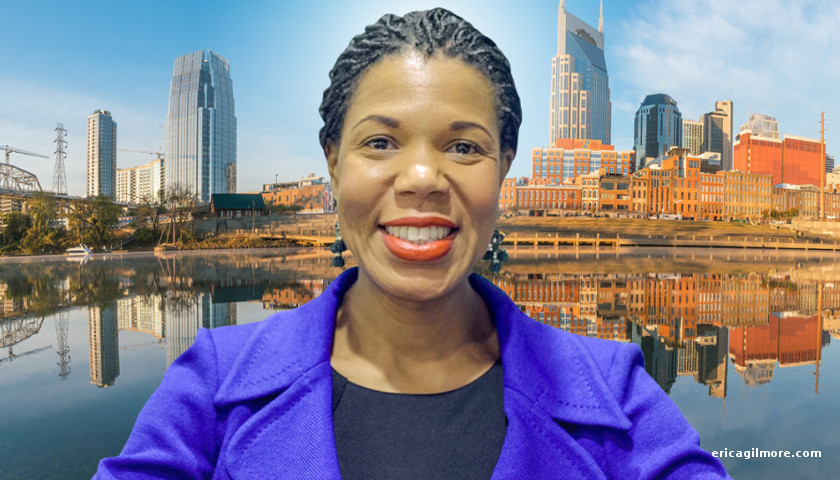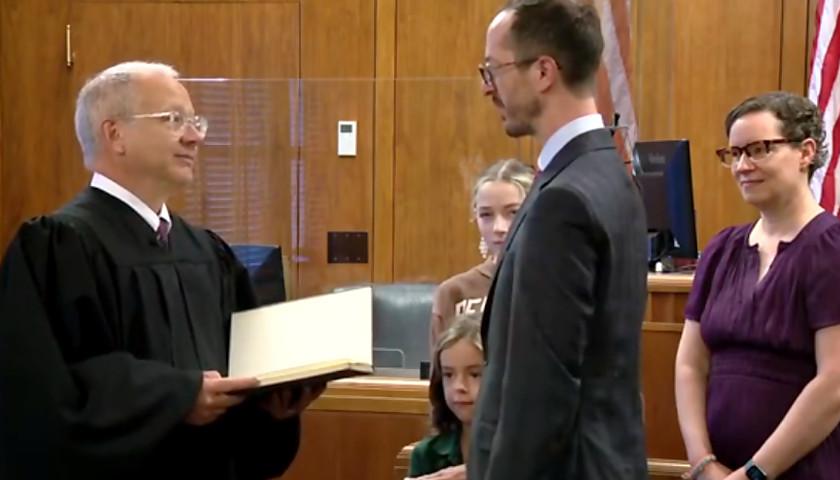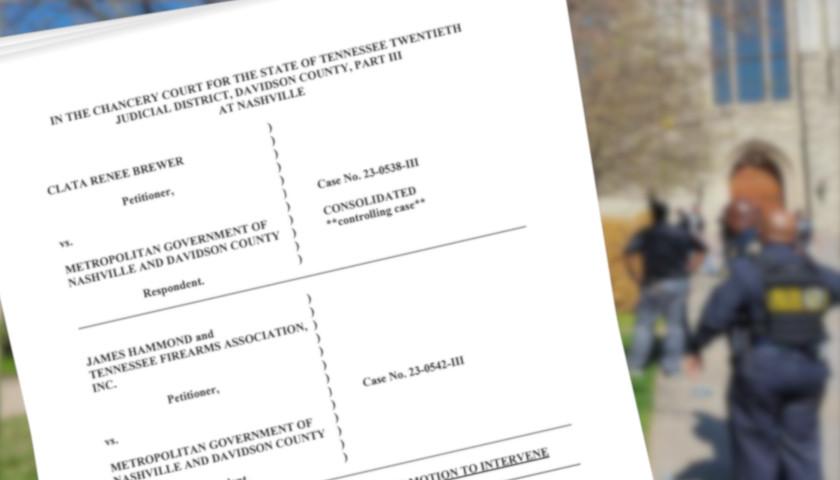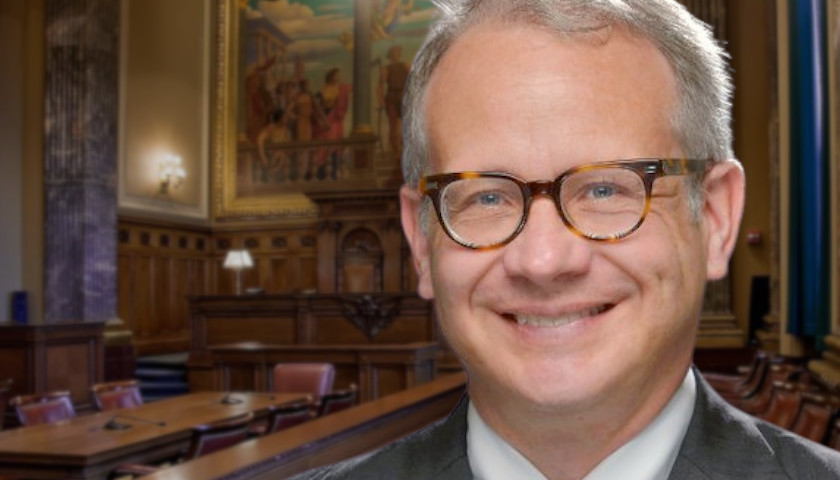Nashville Metro Council Member At-Large Erica Gilmore’s announcement on Wednesday that she is a candidate for Mayor of Nashville in the special mayoral election was greeted with a polite but terse acknowledgement from the campaign of the only other credible candidate currently in the race, Acting Mayor David Briley.
“We welcome Councilwoman Gilmore to the race,” was all Hannah Paramore, Briley’s campaign treasurer, had to say about Gilmore in a statement issued after her announcement.
Paramore went on to tout Briley’s qualifications for the job he temporarily holds, but wants to make more permanent:
In just a few short weeks, David Briley has brought focus to the job of managing the city, tackling challenges and making progress on opportunities that will benefit all of Nashville. He has delivered a steady, guiding hand when it was needed to regain public confidence. David Briley is the right person to lead our city, and I am confident that the widespread support that is rapidly forming behind David will result in his winning the special election.”
Briley is considered the front runner in the race, thanks in part to the backing of much of the Nashville business community, and his greater ability to raise money.
Few political observers give Gilmore much of a chance to upset Briley in a two-person race, but so far, 2018 has been a political year filled with surprises at the national, state, and local level, and any combination of unforeseen circumstances could arise between now and the date of the special Nashville Mayoral election.
The Davidson County Election Commission initially set the date for the special Nashville Mayoral election as August 2, but the Tennessee Supreme Court has accepted a legal challenge to that date and will hear oral arguments from both sides of the case next Monday on April 9. The court could accept the August 2 date for the special election, or choose one of two others: May 26 or May 1.
Setting either May 1 or August 2 as the date for the special election would incur no additional expenses for the Nashville/Davidson County Metro Government, as May 1 is already set as as the date for the transit referendum and the primary for minor county offices, and August 2 is set as the date for the general election for minor county offices.
Every attorney The Tennessee Star has spoken with about the merits of the case say that if the Court follows the letter of the law, it will set the special election date as either May 1 or May 26. However, there are practical problems with either date.
A May 1 date may not be possible, since the law requires that absentee ballots must be sent out at least 30 days prior to any election, sources tell The Star, and those ballots have not been sent out, in part because the filing deadline for potential mayoral candidates is this Thursday, April 5.
A May 26 special election date would require the Nashville/Davidson County Metro Government to spend up to another $2 million to conduct a separate election, sources say.
Briley, who was elected vice-mayor in August 2015, became acting mayor when former Mayor Megan Barry resigned on March 6 after pleading guilty to felony theft charges earlier in the day related to her two year long extramarital affair with her bodyguard, former Metro Nashville Police Sergeant Rob Forrest.
On March 8, two days after Briley was named acting mayor, the Nashville Business Council issued a statement telling other potential candidates not to enter the race. Republican gubernatorial candidate Bill Lee, who was a member of the Nashville Business Council but was not consulted prior to the issuance of that statement, resigned in protest.
That same day, Briley announced that he was a candidate for mayor in the special election that was scheduled to allow Nashville/Davidson County voters to pick a mayor to serve the remainder of former Mayor Barry’s term, which is scheduled to expire in August 2019.
Three potential candidates, all of whom with sufficient financial resources to mount a serious campaign for mayor, all declined to run: real estate magnate Bill Freeman, former mayoral candidate David Fox, and businessman Stuart McWhorter.
Unlike Freeman, Fox, and McWhorter, Gilmore stepped into the arena on Wednesday, in this announcement statement, posted as a Facebook video on her campaign website:
Hello Nashville. For eleven years, you have given me the distinct honor to serve you on the Metro Council as Council Member from District 19, and Council Member at Large.
During that time, I’ve been a leader on the Council in the fight to save Metro General Hospital, to build more affordable housing, and to tackle the growing wealth inequality in our city. This mayoral election is a critical one. Either we will grow together as one Nashville, or we will leave far too many behind.
That is why I believe I’m the person to lead us toward the growth that benefits all of Nashville.
After much prayer, reflection, and consulting with my family and constituents across this wonderful city, it gives me great joy to announce today that I, Erica Gilmore, am running for mayor this year. I’m asking for your vote, and over the next few months, I look forward to earning it.
Both Gilmore and Briley support former Mayor Barry’s proposed the $9 billion transit plan, which voters will either approve or reject in the May 1 referendum.
Most transportation and economic experts, including those from the Heritage Foundation and the Cato Institute, call the plan a boondoggle. Economist Art Laffer and Republican gubernatorial candidate Diane Black said the plan “will mire Nashville in debt and taxes” that is also bad for the entire state of Tennessee in a recent op-ed at The Tennessean.
Neither Briley, in his campaign website, nor Gilmore, in her campaign website, offer any detailed information on their policy positions or proposals for the city.
Both, however, embrace former Mayor Barry’s far left, tax increasing, big spending, government-centric policies.
Former Vanderbilt professor Carol Swain wrote recently in an op-ed at The Star titled “Nashville Needs a Choice, Not an Echo, in Mayoral Election,” that “so far, no strong candidates have risen to challenge interim Mayor David Briley. Consequently, there is no different vision for the city. Briley is about continuity and carrying forward the vision Megan Barry and the business leaders and developers cast for the city. No one seems to question if Megan Barry’s vision for the city was what native Nashvillians needed or wanted,” adding:
Before we start digging downtown tunnels and laying 20-plus miles of new tracks, Nashville has plenty of higher-priority issues that must be addressed. Start with health care, criminal justice reform, quality education, and race relations.
The black community in Nashville has some leaders who are beginning to wake up to the fact that the city’s long succession of Democratic mayors has often given them the short end of the stick in exchange for their loyal support. In the case of the transit plan, high-powered black leaders such as Howard Gentry and Jerry Maynard of the Maynard Group have been tapped to sell the plan to black voters. Blacks are told that passage of the transit plan will result in more jobs for them, more contracts for minority businesses, and better bus service to minority communities. However, the rising taxes that would accompany the passage of the bill will likely make the city more unaffordable for blacks and lead to increased crime and racial tensions.
“Before the noon April 5 deadline, Nashville needs other candidates to enter the mayoral race. It is a false narrative that all was well before Mayor Barry’s downfall and that the solution is for a virtually uncontested David Briley to have a cakewalk across the finish line,” Swain concluded.
Despite Council Member Erica Gilmore’s entry into the race, Acting Mayor David Briley remains the prohibitive favorite, though he can no longer be considered a shoo-in.
Several quixotic potential candidates are said to be entertaining the possibility of filing to run for mayor before the April 5 deadline, but none, so far, have the status, funding, or reputation necessary to be considered “strong candidates” of the sort Swain argued the race needs to offer Nashville voters “a choice, not an echo.”






The fix is in.
[…] Tennessee Star Staff | The Tennessee Star […]
Whatever that means.